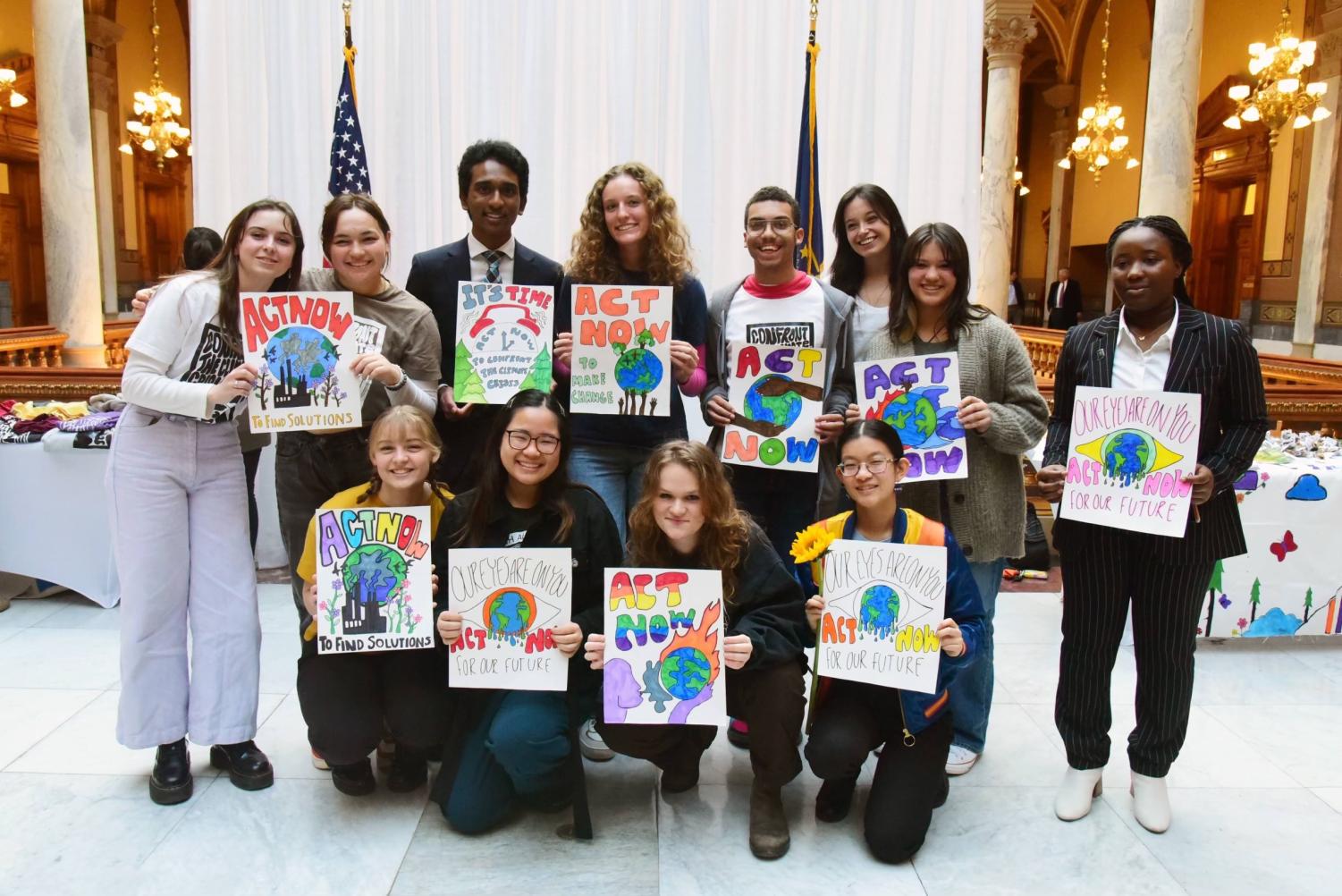
Veda is a senior at FHS, it is her second year as Features editor and first as Online copy editor for the Tiger Times. She is also one of the directors...


Ways of students getting involved in preserving the Earth
March 6, 2023
The environment is very interconnected. One change of imbalance affects many more aspects of the environment. According to National Geographic, Earth has seen 20,000 years worth of change in the past 170 years Human activities have led to a rise in carbon concentrations by 48%. This rapid increase in carbon has had a large number of effects on the environment. Overall, increased carbon, and impacts of it, is a big contributor to climate change.
As the United Nations states, climate change refers to long-term shifts in temperatures and weather patterns.
According to the United States Environmental Protection Agency, there has been a 1.8°F change in global average temperature from 1901 to 2016. Although this can seem like a small change, its impact on the environment is almost irreversible. Some of those severe effects are melting ice caps, leading to a rise in sea level, warmer and acidic oceans, severe heat waves and changes in rainfall, leading to droughts and floods.
It is very important that today’s students are educated about this. It is often mentioned and studied in the curriculum.
FHS Environmental club’s President for next year, junior Junsuk Park believes that development is linked with the environment.
“As the world goes on, it’s developing in a way our environment has to be hurt for our gain,” Park said. “If this continues without anyone trying to make changes, we’re going to reach a certain point called the tipping point, where even if we try to change, we can’t set anything back. We need to make a change before that tipping point.”
Students concerned with the situation work towards conserving the environment. Confront the Climate Crisis (CTCC) is one organization that is run by students all across the state. It focuses on climate education and activism. Senior Chenyao Liu at Carmel High School is one of the co-executive directors of CTCC.
“A lot of youth in Indiana have gotten involved with trying to pass local climate resolutions or even just smaller things at their schools, trying to start recycling, composting and gardening initiatives,” Liu said. “The goal of CTCC is to unite youths from all these different cities and counties. We have this one unified place where we can bring together all of our voices and power.”
Founded in September 2020, the group organized numerous rallies throughout the pandemic. Last year, they worked with Indiana state representatives to put up a climate task force bill in the state house.
“To be sustainable and to be environmentally friendly, it’s going to require passing legislation,” Liu said.
A number of speakers from organizations and student groups that supported the bill were invited. According to Liu, many people showed up to testify to the bill by expressing reasons behind their support. Although many were adults, there were also young people, including one high schooler in Indiana Legislative Youth Advisory Council.
“We had this day to stand united and ask for our bill to get a hearing in the Indiana legislative session,” Liu said. “ The committee chair for the Senate Environmental Affairs Committee heard our bill on President’s Day. A few of us went to the State House to sit in on the committee and really show the senators that this is something that’s important to us, we really want to get this bill passed.”
The result was not on their side and the bill was not heard in the legislative session. Although, they have hopes for next year since CTCC has created a larger base of support.
Being involved in organizations like these is not the only way the youth can contribute to the protection of the environment. Park believes that it is crucial to spread awareness and take collective action to combat the issue.
“It can look very different to different people,” Liu said. “For young people, protecting the environment can be going to your school board and asking them to transition to solar energy. It could be making a petition and sending it to your school lunch ladies and starting a composting initiative. It could be also taking up these aggressive steps that don’t just involve you, but involve your community. There could also be asking for legislation to protect our wetlands or to help with [the] transition to clean energy.”
Park also believes that protecting the environment is something everyone should do as a moral obligation. Furthermore, he believes that it is important to look after the Earth.
“Not to just this world, but to the future generation, to ourselves, to our younger siblings, our parents,” Park said. “Not only [will we] have to live through that, but everyone else after us [as well].”
Some basic, less time and effort consuming practices Liu follows to protect the environment include reducing meat intake, shopping local, reducing use of plastic bags, using tote bags, reducing use of dryers and air drying clothes.
“Every time we get plastic bags at the grocery store, we put them in a plastic bag,” Liu said. “So we have a plastic bag full of plastic bags that we use all the time. I think the big thing that people often forget is that when you look at the green arrow triangle- reduce, reuse, recycle- the first step is to reduce. Not that recycling is bad, but that it should be the last step.”
More ways that students can contribute towards preserving the environment is by shopping locally grown groceries, since it reduces overall carbon emissions, thrifting clothes and reusing waste for art projects.
Liu believes that one of the many reasons behind fighting the climate crisis is to secure a safer future. She also thinks it is important and desirable to have clean surroundings to improve the quality of life not just for oneself but for everyone around as well.
“We’re going to be around for many more years and we wanna make sure that we have a clean future,” Liu said. “We want clean air, clean water. I want to be able to go on a hike even when I’m 30-40 years old.”
Both Liu and Park agree that it is important for the youth to be involved in protecting the environment.
“By taking action and informing ourselves about the climate crisis, about the environment, it’s setting us up for success, even if it’s just a couple steps forward,” Park said.
From her own experience, it leads to developing leadership and communication skills. It also contributes towards allowing for more involvement in the community and learning more about the people around, and their needs.
Park believes the age gap between the generations is a reason older people often do not understand the crucial situation.
“Of course with them having an older age, they have more experience,” Park said. “But that also interferes with wanting to learn about [the importance of combating climate change] because they’re already so well off, why would they listen to kids?”
Liu believes that with young people being involved, they bring a lot of energy and life to the movement.
“They become very passionately involved,” Liu said. “Because we’re young, we’re excited about what the future could look like and what the world ahead of us is going to bring after school.”
Although stressful, Liu also found it helpful to be connected to legislators and learn more in-depth about the processes and work behind the legislation.
“It’s good because I’m more aware of how to get civically engaged,” Liu said.
On the not so bright side, the youth’s involvement also has its drawbacks. Many students are involved in extracurriculars, have rigorous schoolwork, work jobs and take care of siblings. With students leading such busy lives, it can be difficult to squeeze out time without compromising any personal responsibilities. This could cause things like overworking and burning out at a young age, which can further progress into a serious issue.
“If young people burn out when they’re in middle school or high school while working in the environment movement, they probably don’t want to get back in because they’re stressed, it is unhealthy,” Liu said. “A lot of organizations have tried to take steps to fix by doing resilience workshops. Not just the sustainability of our earth, but how to make sure that an organization that’s trying to focus on environmental action doesn’t burn [it’s members] out. There’s been more awareness towards that issue, it’s such a stressful and big thing like eco anxiety. Climate anxiety is serious.”
Eco anxiety, as defined by Iberdrola, is the psychological impact on a person who realizes how climate change threatens the future of the earth.
Although everyone is not as enthused about protecting the environment, Liu believes that they can be more aware of the consequences that their actions and other people’s actions have on the environment.
“If you use a bunch of plastic bags one day or you go to Starbucks and you use a plastic straw instead of a paper straw, that’s not the end of the world,” Liu said.
Liu also believes that people are overpressured to look sustainable, and it is not helpful to shame them because they are not protecting the environment.
“A lot of people have a lot of guilt [believing] they’re not taking care of the environment,” Park said. “But even if you try just a little, it’s okay because taking that little step is better than taking no step at all. Informing yourself is a good thing to do.”
Liu re-emphasizes how crucial it is to protect the environment, since it not only affects the environment itself, but also many more components of future lives.
“Climate change is going to be a really big part of our future,” Liu said. “It’s going to affect our economy, it could lead to more natural disasters. It’s just gonna affect infrastructure and it is going to affect public health and a lot of aspects of our lives. I think a big goal in protecting the environment is making people aware of why they need to protect the environment and show people how.”

Veda is a senior at FHS, it is her second year as Features editor and first as Online copy editor for the Tiger Times. She is also one of the directors...